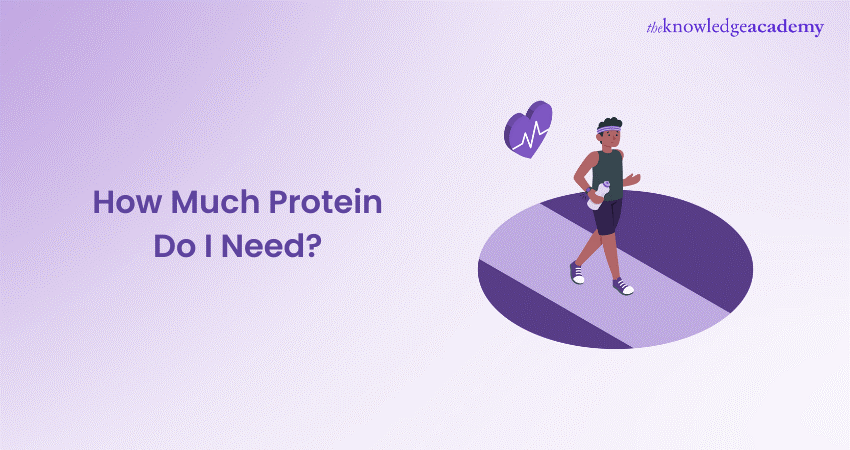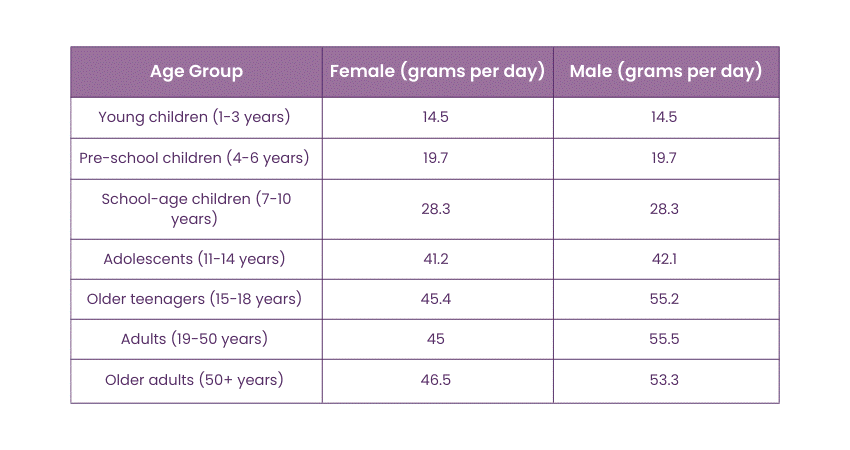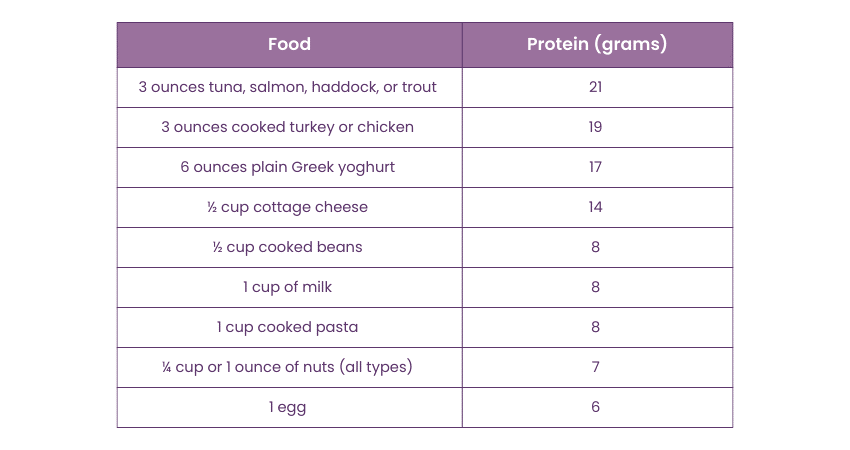We may not have the course you’re looking for. If you enquire or give us a call on 01344203999 and speak to our training experts, we may still be able to help with your training requirements.
Training Outcomes Within Your Budget!
We ensure quality, budget-alignment, and timely delivery by our expert instructors.

Have you ever stuck yourself wondering, “How Much Protein do I Need?” If so, you aren't alone! Protein is a vital nutrient that powers your body, helping muscle growth, tissue restoration, and energy levels. But identifying the right amount can experience intricate. Don’t fear; this blog will help you discover the precise protein intake for your precise requirements. Let’s read ahead to know more!
Table of Contents
1) What is Protein?
2) Why is Protein Important?
3) Daily Protein Requirements
4) Effects of Excess Protein Intake
5) Are Protein Supplements Necessary?
6) Good Sources of Protein
7) Conclusion
What is Protein?
Protein is a nutrient that our body requires in huge amounts. It is important for our hair, pores and skin, bones, and muscle mass. Protein additionally helps make enzymes, hormones, and neurotransmitters important for body capabilities.
Proteins are manufactured from long chains of amino acids. These constructing blocks aid in restore and growth. There are entire 20 amino acids, and nine of them are crucial because our body can't produce them. We have to get those from our weight-reduction plan.
Animal meals like meat and fish, and plant resources like soy, quinoa, buckwheat, and Quorn, provide all critical amino acids. This makes them top-notch protein resources. When we eat them, our digestive system breaks the proteins down into amino acids that our body can utilise.
Why is Protein Important?
Proteins are important for building and repairing cells and ensuring they remain oxygenated and nourished. For example, red blood cells have a protein called haemoglobin. It transports oxygen throughout the body. Similarly, albumin, a protein in the blood, helps regulate water balance in tissues, preventing swelling.
Daily Protein Requirements
The Reference Nutrient Intake (RNI) for protein in the UK is 0.75 grams per kg of body weight. This minimum amount is based on the needs of an average sedentary adult. Here are the guidelines for healthy, non-active individuals:

Learn how to develop a healthy diet and exercise program with our Nutrition and Fitness Training - Sign up today!
Effects of Excess Protein Intake
Some high-protein foods are less healthy because they contain additional fat and salt. Excess protein can lead to the following outcomes:
a) Kidney Damage: Consuming excess protein can strain the kidneys, potentially resulting in kidney damage or kidney stones.
b) Dehydration: High protein intake can increase urination, which may result in dehydration if fluid intake is not adequately maintained.
c) Digestive Issues: Excessive protein can cause digestive problems such as constipation, bloating, and discomfort.
d) Weight Gain: Surplus protein is often stored as fat, leading to weight gain over time.
e) Bad Breath: High-protein diets, especially those low in carbohydrates, can lead to bad breath due to the production of ketones.
f) Nutrient Deficiency: Focusing too much on protein can result in a lack of other necessary nutrients, resulting in imbalances and deficiencies.
Are Protein Supplements Necessary?
While protein dietary supplements can be useful in certain situations, it is essential to recognise when and why you would possibly need them. Here are some key concerns:
a) Dietary Sufficiency: Most humans can meet their protein necessities via a balanced diet without the requirement for dietary supplements.
b) Specific Requirements: Athletes, bodybuilders, and those with advantageous scientific conditions also can gain from greater protein consumption.
c) Convenience: Protein dietary supplements can be a handy desire for people with busy life or restrained access to protein-rich ingredients.
d) Quality and Safety: It's important to select well-recognised protein supplements and be aware about potential contaminants.
e) Nutrient Balance: Relying too closely on supplements can result in imbalances and forgetting about the other important nutrients found in complete meals.
Good Sources of Protein
Here is a table summarising the protein content of various foods. This can help you track your protein intake and make informed dietary choices:

Do you want to recognise how to develop positive health habits in your daily lifestyle? Sign up for our Healthy Lifestyles Training now!
Conclusion
Understanding How Much Protein do I Need is important for supporting your health and fitness goals. By eating the proper quantity through a balanced weight-reduction plan of extremely good protein sources, you may fuel your body, promote growth, and stay energised. Adjust your consumption primarily based on your lifestyle, requirements, and activity level.
Enhance your food safety standards with our Food Hygiene and Safety Training - Register now!
Frequently Asked Questions

To calculate protein desires, multiply your frame weight in kilograms by means of 0.8-2.0 grams, relying on pastime degree. For sedentary humans, use 0.8g/kg; for active or energy training individuals, aim for 1.2-2.0g/kg. This guarantees that you meet your body’s requirements primarily based on your lifestyle.

To build muscle, aim for 1.6-2.2 grams of protein per kilogram of body weight daily. This range supports muscle growth and repair during strength training. For example, a 70kg person should consume 112-154 grams of protein a day, spread across meals for optimal results.

The Knowledge Academy takes global learning to new heights, offering over 30,000 online courses across 490+ locations in 220 countries. This expansive reach ensures accessibility and convenience for learners worldwide.
Alongside our diverse Online Course Catalogue, encompassing 19 major categories, we go the extra mile by providing a plethora of free educational Online Resources like News updates, Blogs, videos, webinars, and interview questions. Tailoring learning experiences further, professionals can maximise value with customisable Course Bundles of TKA.

The Knowledge Academy’s Knowledge Pass, a prepaid voucher, adds another layer of flexibility, allowing course bookings over a 12-month period. Join us on a journey where education knows no bounds.

The Knowledge Academy offers various Health & Safety Courses, including Food Hygiene and Safety Training, Nutrition and Fitness Training and Active and Healthy Lifestyle Training. These courses cater to different skill levels, providing comprehensive insights into Food Safety Management System.
Our Health & Safety Blogs cover a range of topics related to Health and Fitness, offering valuable resources, best practices, and industry insights. Whether you are a beginner or looking to advance your Fitness, The Knowledge Academy's diverse courses and informative blogs have you covered.
Upcoming Health & Safety Resources Batches & Dates
Date
 Food Safety and Hygiene Course
Food Safety and Hygiene Course
Fri 7th Mar 2025
Fri 2nd May 2025
Fri 4th Jul 2025
Fri 5th Sep 2025
Fri 7th Nov 2025







 Top Rated Course
Top Rated Course



 If you wish to make any changes to your course, please
If you wish to make any changes to your course, please


